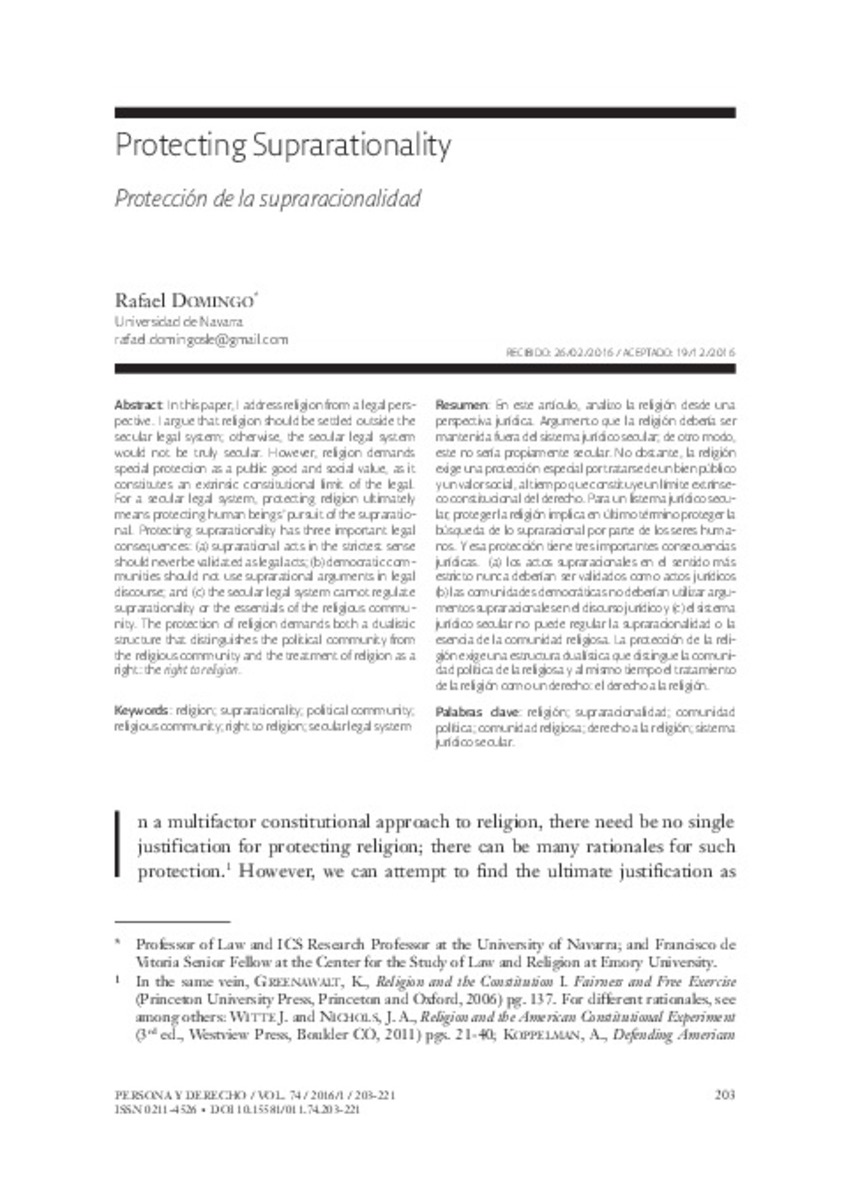Full metadata record
| DC Field | Value | Language |
|---|---|---|
| dc.creator | Domingo-Oslé, R. (Rafael) | - |
| dc.date.accessioned | 2017-09-13T10:31:10Z | - |
| dc.date.available | 2017-09-13T10:31:10Z | - |
| dc.date.issued | 2016 | - |
| dc.identifier.citation | Domingo, R. (Rafael). "Protección de la supraracionalidad". Revista Persona y Derecho. (74), 2016, 203 - 221 | es |
| dc.identifier.issn | 0211-4526 | - |
| dc.identifier.uri | https://hdl.handle.net/10171/43869 | - |
| dc.description.abstract | En este artículo, analizo la religión desde una perspectiva jurídica. Argumento que la religión debería ser mantenida fuera del sistema jurídico secular; de otro modo, este no sería propiamente secular. No obstante, la religión exige una protección especial por tratarse de un bien público y un valor social, al tiempo que constituye un límite extrínseco constitucional del derecho. Para un listema jurídico secular, proteger la religión implica en último término proteger la búsqueda de lo supraracional por parte de los seres humanos. Y esa protección tiene tres importantes consecuencias jurídicas. (a) los actos supraracionales en el sentido más estricto nunca deberían ser validados como actos jurídicos (b) las comunidades democráticas no deberían utilizar argumentos supraracionales en el discurso jurídico y (c) el sistema jurídico secular no puede regular la supraracionalidad o la esencia de la comunidad religiosa. La protección de la religión exige una estructura dualística que distingue la comunidad política de la religiosa y al mismo tiempo el tratamiento de la religión como un derecho: el derecho a la religión. | - |
| dc.description.abstract | In this paper, I address religion from a legal perspective. I argue that religion should be settled outside the secular legal system; otherwise, the secular legal system would not be truly secular. However, religion demands special protection as a public good and social value, as it constitutes an extrinsic constitutional limit of the legal. For a secular legal system, protecting religion ultimately means protecting human beings’ pursuit of the suprarational. Protecting suprarationality has three important legal consequences: (a) suprarational acts in the strictest sense should never be validated as legal acts; (b) democratic communities should not use suprarational arguments in legal discourse; and (c) the secular legal system cannot regulate suprarationality or the essentials of the religious community. The protection of religion demands both a dualistic structure that distinguishes the political community from the religious community and the treatment of religion as a right: the right to religion. | - |
| dc.language.iso | spa | - |
| dc.publisher | Servicio de Publicaciones de la Universidad de Navarra | - |
| dc.rights | info:eu-repo/semantics/openAccess | - |
| dc.subject | religión | - |
| dc.subject | supraracionalidad | - |
| dc.subject | comunidad política | - |
| dc.subject | comunidad religiosa | - |
| dc.subject | derecho a la religión | - |
| dc.subject | sistema jurídico secular | - |
| dc.subject | religion | - |
| dc.subject | suprarationality | - |
| dc.subject | political community | - |
| dc.subject | religious community | - |
| dc.subject | right to religion | - |
| dc.subject | secular legal system | - |
| dc.title | Protección de la supraracionalidad | - |
| dc.title.alternative | Protecting Suprarationality | - |
| dc.type | info:eu-repo/semantics/article | - |
| dc.identifier.doi | 10.15581/011.74.203-221 | - |
| dadun.citation.endingPage | 221 | - |
| dadun.citation.number | 74 | - |
| dadun.citation.publicationName | Revista-Persona-y-Derecho | - |
| dadun.citation.startingPage | 203 | - |
| dadun.citation.volume | 0 | - |
| dc.date.updated | 2017-09-13T10:31:10Z | - |
| dc.description.version | Peer Reviewed | - |
Files in This Item:
Statistics and impact
Items in Dadun are protected by copyright, with all rights reserved, unless otherwise indicated.






